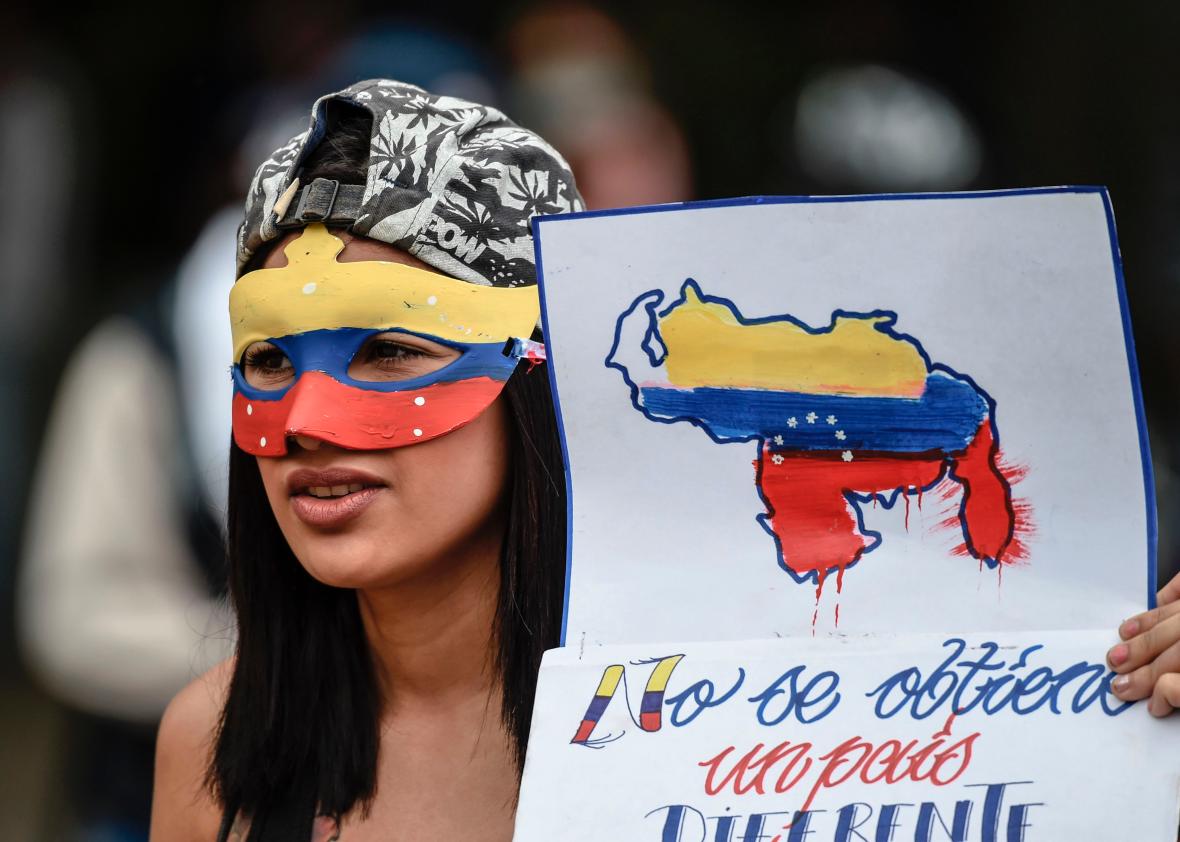Netizen Report: Venezuela’s Conflict Moves From the Streets to the Internet

AFP/Getty Images
The Netizen Report offers an international snapshot of challenges, victories, and emerging trends in internet rights around the world. It originally appears each week on Global Voices Advocacy. Afef Abrougui, Ellery Roberts Biddle, Marianne Diaz, Don Le, Elizabeth Rivera, Laura Vidal, and Sarah Myers West contributed to this report.
On the night of June 28, internet users across Venezuela reported that multiple major web and social media sites had gone dark. According to the digital rights organization Venezuela Inteligente:
DNS servers of the State’s Internet Service Provider CANTV were not responding to the DNS requests on Facebook, Twitter, YouTube, Instagram and Periscope, preventing users to access these platforms.
An hour later, users were able to access those sites again. This wave of censorship comes in a moment when Venezuela’s government is facing record levels of public opposition and unrest, and a rapidly escalating economic crisis that has led to widespread hunger and threats to public health countrywide. Internet access has significantly deteriorated since May 2016, when the government declared a (still ongoing) state of emergency and officially authorized online content filtering. In May 2017, the Index on Censorship published evidence of 41 websites being blocked in the country.
While authorities may see social media censorship as a useful short-term mechanism for limiting speech that sparks public unrest, they too rely on internet access to communicate with their citizens.
Just last week, Venezuelan President Nicolas Maduro ordered officials to investigate Twitter employees in Venezuela for suspending the accounts of 180 government employees and chavistas, as supporters of former president Hugo Chávez are known. Maduro vowed to “unmask” the identities of the Twitter officials responsible and to create thousands of new accounts to continue the “battle on social media.”
One Vietnamese blogger jailed, another forced into exile
On June 29, well-known Vietnamese human rights blogger and community leader Nguyen Ngoc Nhu Quynh (who blogged under the name Mother Mushroom) was sentenced to 10 years in prison after a Khanh Hoa district court convicted her of distorting government policies and defaming the Communist regime both on Facebook and in interviews with foreign media outlets.
Vietnamese authorities also forced professor Pham Minh Hoang into exile on June 24. Hoang was stripped of his nationality in May and forcibly removed from his house on June 23. He said he was detained for 24 hours before authorities forced him onto a plane to Paris. He is now separated from his wife and young daughter and unable to take care of his disabled older brother. A blogger and member of Viet Tan, the Vietnamese democratic political movement, Hoang was detained for 17 months beginning in 2010. He has conducted trainings on cybersecurity, human rights, and leadership skills since his release. “I still have a little hope, one day, to come back to live and die in Vietnam,” he told Associated Press.
Independent Cuban journalist arrested, accused of spreading “false news”
Cuban journalist Manuel Alejandro León Velázquez was arrested by Cuban state security officers in Guantánamo province and detained for two days. Police also confiscated electronic equipment; mobile phone; several hundred dollars worth of U.S., EU, and Cuban currency; and his passport and press card. León Velázquez is a reporter for the independent news website Diario de Cuba and has covered hurricane relief efforts and infrastructure challenges in eastern Cuba. He has been summoned for a meeting with police on July 3, who charge that he has been distributing “false news.”
Moroccan web editor detained, awaiting trial
A video journalist and the director of the news website Rif24 was arrested on June 6 in the Rif region of Morocco, where protests focused on the declining economy, poor infrastructure, and government corruption have been taking place since October 2016. Mohamed al-Asrihi is currently in pre-trial detention on charges including practicing journalism without official accreditation and receiving foreign funding from “separatists” abroad. He is reportedly being held in solitary confinement in Casablanca’s Oukacha Prison.
At Thailand’s behest, YouTube censors Charlie Chaplin’s Great Dictator
A video clip of Charlie Chaplin’s The Great Dictator has been blocked on YouTube at the behest of the military-backed government of Thailand. Internet users reported on June 24 that the video clip with Thai subtitles was inaccessible on YouTube. The page for the video instead displayed the standard message: “This content is not available on this country domain due to a legal complaint from the government.”
The 1940 film The Great Dictator parodied the rise of Nazi leader Adolf Hitler. June 24 is the day when Thailand commemorates the 1932 revolution, which ended the country’s absolute monarchy.
Chinese netizens’ days using VPNs may be numbered
Internet users are anticipating that the majority of virtual private network apps for individual use will be inaccessible in mainland China by July 1. Whisperings of a state ban on unauthorized VPNs spread widely on Twitter and Weibo after the popular VPN service provider Green announced that the company would cease operations by July 1. That date is sensitive because it marks the 20th anniversary of the transfer of Hong Kong from British to Chinese power. However, there is not yet conclusive evidence that there is a direct connection. The move may also indicate a forthcoming ban has been expedited. China’s Ministry of Industry and Information Technology had announced that it will ban “illegal services,” including unauthorized VPNs, in March 2018.
Kenyan officials promise not to shut down the internet on election day
After Gabon and the Gambia shut down networks during recent elections, inquiring minds want to know whether Kenya will follow in their footsteps during upcoming elections on Aug. 8. In a press statement, Kenyan Information and Communications Technology Cabinet Secretary Joe Mucheru affirmed, “We are a digital country and that is not our intention. It is not even a remote fall back position.”
Netizen activism
The U.N. special rapporteur on violence against women is soliciting input for a report on online violence against women and girls. Submissions should be sent by Sept. 30, 2017.
Future Tense is a partnership of Slate, New America, and Arizona State University.

